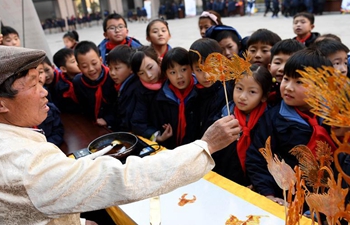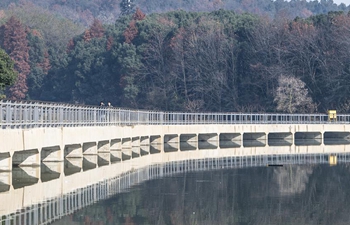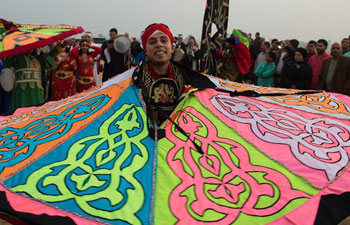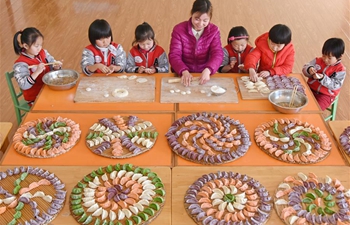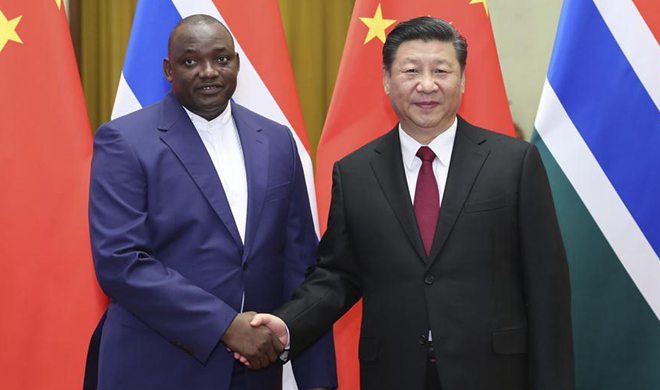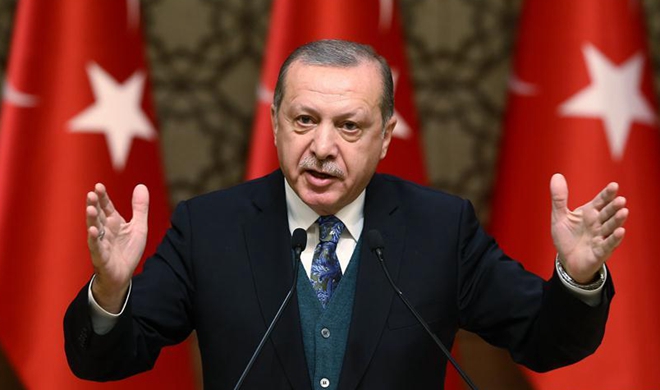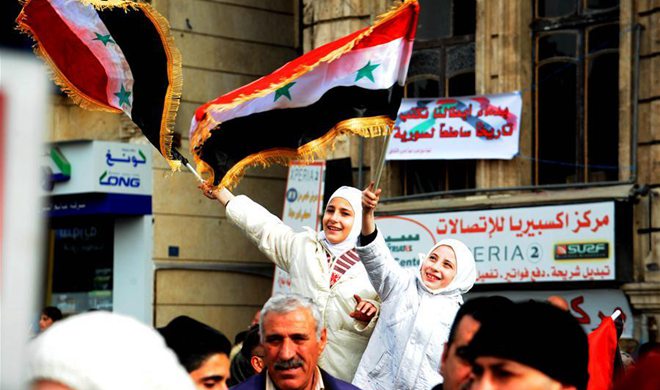by Feng Yingqiu
YANGON, Dec. 22 (Xinhua) -- Myanmar has achieved initial success in its push for national reconciliation and its peace process in 2017.
The government and eight ceasefire signatory armed groups agreed on seven points at the 6th Joint Implementation Coordination Meeting (JICM) on ceasefire agreement in late November, paving the way for the ceasefire to continue.
Their decision included the convocation of the third meeting of the 21st Century Panglong Peace Conference in late January 2018 and the holding of the 7th JICM meeting in late February.
National level political dialogue with the Restoration Council of Shan State (RCSS) or Shan State Army-South (SSA-S) was also held and continued efforts were made for the Arakan Liberation Party (ALP) to conduct national level discussions.
The JICM's significance was highlighted by the attendance of State Counselor Aung San Suu Kyi and Deputy Commander-in-Chief of the Defense Services Vice Senior General Soe Win, as well as leaders of eight signatory armed groups to the Nationwide Ceasefire Accord (NCA).
Suu Kyi, chairperson of the National Reconciliation and Peace Center (NRPC), has occasionally called for all-inclusiveness in the country's national reconciliation and peace process, reiterating that the door is always open to non-ceasefire signatory armed groups to join the signing of the NCA.
Suu Kyi, who is also chairperson of the Union Peace Dialogue Joint Committee (UPDJC), said the government places great emphasis on the participation of the non-signatories to the NCA in the process, and urges the completion of work for laying down the basic principles for a federal union in 2018.
She stressed the need to draw up Standard Operating Procedures (SOP) to be able to implement the agreements effectively.
Suu Kyi also expected the early conclusion of amending the framework for political dialogue to be presented to the upcoming third meeting of the 21st Century Panglong Peace Conference before moving to the political dialogue.
Meanwhile, some non-ceasefire signatory armed groups signaled that they were prepared to sign the NCA following a breakthrough made at the 7th meeting between the Delegation for Political Negotiation (DPN) of the United Nationalities Federal Council (UNFC) and the government's Peace Commission.
Following the initiation of the NCA between the government and eight of 15 ethnic armed groups on Oct. 15, 2015, Myanmar's government held the 21st Century Panglong Peace Conference two times respectively in August 2016 and May 2017.
The second meeting of the Panglong Peace Conference was able to incorporate a total of 37 adopted principles into a union accord in the peace process for the first time in Myanmar's history.
The 37 adopted principles were signed by representatives of participating groups of the government, parliament, military, signatory armed groups to the NCA and political parties as Part One of the Union Accord.
The upcoming third meeting of the 21st Century Panglong Peace Conference will deal with unfinished fundamental principles as well as new principles on federalism.
Agreeing that a federal system is the only solution for the internal armed conflict which has been unresolved under successive governments, Suu Kyi warned that the opportunity to end the conflict by political means is in the right hands now.
She added that the people of Myanmar have great expectations for the upcoming Panglong Peace Conference.
In terms of the future, she called for continuing the ceasefire mechanism, being brave in both thoughts and deeds and striding towards ending all wars and conflicts in the country.
Meanwhile, Myanmar's Rakhine issue, which originated from fresh attacks on police outposts in Rakhine on Aug. 25 by Arakan Rohingya Salvation Army (ARSA), remained a challenge to the government.
The terrorist attacks have displaced residents from a number of areas in the Maungtaw district.
State Counselor Suu Kyi has urged the Rakhine issue be solved in three ways, including focusing on a diplomatic approach, reconstruction for development and security for the local people.
She made the call after a trip to the northern part of Rakhine state affected by terrorist attacks over the past several months.
During her first ever visit to villages in Rakhine, including Pantawpyin, Taungpyo Letwe, Khonhtaing and Kyikanpyin in Maungtaw since the terrorist attacks in August that undermined the stability of the area, Suu Kyi urged the local people to cooperate in the long-term reconstruction and resettlement.
She offered to provide vocational training and healthcare services to the local people and suggested they grow rice as well as other crops as the area contains fertile soil.
Accordingly, the Myanmar government has been implementing short-term projects in northern Rakhine after the region regained security and stability.
In the face of international accusations of Myanmar's mishandling of the Rakhine issue, the government organized a number of fact-finding trips for diplomats and foreign media to visit the conflict-hit areas.
The government has also sought the assistance from the international community for the resettlement of the displaced ethnic people and asked the United Nations Human Settlement Program to help with the move.
On Oct. 17, the government formed the Union Enterprises for Humanitarian Assistance, Resettlement and Development (UEHRD), led by Suu Kyi, for the effective implementation of the long-term project of freedom from conflict.
The government also formed nine private sector task forces to join the Suu Kyi-led mechanism of UEHRD in northern Rakhine.
Suu Kyi prioritized three main tasks to be achieved in Rakhine, namely, the repatriation of refugees who have crossed over to Bangladesh and providing humanitarian assistance effectively; resettlement and rehabilitation; and bringing development to the region and establishing lasting peace.
Accordingly, the government started the national verification and repatriation process on Oct. 1, which was one of the recommendations proposed by an advisory commission on the state, led by former UN Secretary-General Kofi Annan, and involved issuing a national verification card to refugees who had fled to Bangladesh.
The national verification process, in accordance with the 1982 Citizenship Law, is being launched in accordance with agreed criteria set out in a joint statement between the foreign ministries of Myanmar and Bangladesh in 1992.
Myanmar and Bangladesh signed an arrangement on the return of displaced persons from Myanmar's Rakhine state in late November to guide the process.
Myanmar has announced its principled position that issues that emerge between the neighboring countries must be resolved amicably through negotiation.
The two countries have also recently agreed to establish border liaison offices in Maungtaw in northern Rakhine and Tak Naf in Bangladesh by December, according to the 4th Myanmar-Bangladesh Central Level Meeting.
Humanitarian aid for Rakhine refugees has been pouring in from donor countries, including China, the United States, Britain, Denmark and the Association of Southeast Asian Nations (ASEAN).
Shortly after Suu Kyi's speech to the nation on the Rakhine issue, China provided 200 million kyats (147,058 U.S. dollars) to help restore peace and stability in Rakhine state.
Two days after the donation, the Chinese Embassy in Myanmar, on behalf of the Chinese government, donated 100 million kyats to the Myanmar Red Cross for use in the rehabilitation of displaced people in Rakhine state.
Meanwhile, Chinese Foreign Minister Wang Yi expressed China's view during a trip to Bangladesh that it is willing to help Bangladesh and Myanmar properly solve the Rohingya issue.
China holds the view that the Rohingya issue can only be solved properly by consultations between Bangladesh and Myanmar, and only through this method can a sustainable agreement be accepted by the parties concerned.
Stressing that poverty is the root cause of turbulence and conflict, the Chinese top diplomat called on the international community to pay more attention to and support poverty reduction and development in Myanmar's Rakhine state.






